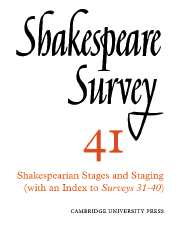Book contents
- Frontmatter
- The Shakespearian Stages, Forty Years On
- The Original Staging of The First Part of the Contention (1594)
- Charles Calvert’s Henry V
- Hamlet, An Apology for Actors, and The Sign of the Globe
- ‘Hid indeed within the centre’: The Hall/Finney Hamlet
- Malvolio and the Dark House
- The Text of Cressida and Every Ticklish Reader: Troilus and Cressida, The Greek Camp Scene
- Antony and Cleopatra, Act 4 Scene 16: ‘A Heavy Sight’
- The Tempest’s Tempest at Blackfriars
- Keats and Lucrece
- The Resources of Characterization in Othello
- Ovid and the Mature Tragedies: Metamorphosis in Othello and King Lear
- The Passing of King Lear
- Shakespeare Performances in London and Stratford-upon-Avon, 1986–7
- Professional Shakespeare Productions in the British Isles, January–December 1986
- The Year's Contributions to Shakespeare Studies: 1 Critical Studies
- 2 Shakespeare’s Life, Times, and Stage
- 3 Editions and Textual Studies
- Books Received
- Index to Volume 41
- General Index to Volumes 31-40
The Text of Cressida and Every Ticklish Reader: Troilus and Cressida, The Greek Camp Scene
Published online by Cambridge University Press: 28 March 2007
- Frontmatter
- The Shakespearian Stages, Forty Years On
- The Original Staging of The First Part of the Contention (1594)
- Charles Calvert’s Henry V
- Hamlet, An Apology for Actors, and The Sign of the Globe
- ‘Hid indeed within the centre’: The Hall/Finney Hamlet
- Malvolio and the Dark House
- The Text of Cressida and Every Ticklish Reader: Troilus and Cressida, The Greek Camp Scene
- Antony and Cleopatra, Act 4 Scene 16: ‘A Heavy Sight’
- The Tempest’s Tempest at Blackfriars
- Keats and Lucrece
- The Resources of Characterization in Othello
- Ovid and the Mature Tragedies: Metamorphosis in Othello and King Lear
- The Passing of King Lear
- Shakespeare Performances in London and Stratford-upon-Avon, 1986–7
- Professional Shakespeare Productions in the British Isles, January–December 1986
- The Year's Contributions to Shakespeare Studies: 1 Critical Studies
- 2 Shakespeare’s Life, Times, and Stage
- 3 Editions and Textual Studies
- Books Received
- Index to Volume 41
- General Index to Volumes 31-40
Summary
It is perhaps because Troilus and Cressida raises the question of women’s sexual identity that it was scarcely performed for three hundred years. I am going to discuss ways in which Shakespeare’s Cressida has been construed by recent critics, producers, and actresses, and how these interpretations might affect the understanding of the play by an audience in the 1980s. Until the 1970s most interpretations manifested precisely that coercive dominance of a particular set of cultural values which is the theme of the play. This was especially marked with respect to what G. Wilson Knight called ‘the pivot incident of the play’: Cressida’s arrival at the Greek army camp. My discussion will centre on this scene, to show how it is a key to the significance of one of the main questions posed by the play: whether a person’s nature or identity is determined by the valuation set on that person by others. This question forms part of the general platonic scepticism which the play develops with regard to the possibility of anything’s having absolute value or identity in a world subject to the digestive effects of time and human judgement. Within the world of the play Cressida is unable to maintain a sense of her own integrity. Similarly, in the course of changes in Western society, the character of Cressida in the text of the play has been subject to changing readings and widely divergent performances. This has inevitably affected the comprehension of the whole play.
- Type
- Chapter
- Information
- Shakespeare Survey , pp. 63 - 76Publisher: Cambridge University PressPrint publication year: 1989
- 4
- Cited by

